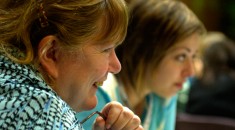Helen Pankhurst grew up in Ethiopia, as a consequence of her famous grandmother, Sylvia Pankhurst, moving there after campaigning against Italy’s invasion.
“After she campaigned on women’s rights, she became more and more of a socialist,” Helen says of her grandmother. “She became interested in a number of causes and she saw the rise of fascism.
“Then Italy invaded Ethiopia and there wasn’t much of a ground swell of resistance to it, so she started a newspaper called the New Times and Ethiopia News.”
Ethiopia was liberated from Italian rule in 1941, but Sylvia remained invested in the country’s fortunes. And in 1956 she moved to Ethiopia with her son, who later raised Helen there.
The effect of growing up in a Pankhurst household in Africa is that Helen is both a feminist and an internationalist.
“I remember as a child seeing some of the ways that women were treated, like the fact that they carry wood and water on their backs,” she recalls.
“Women were doing physically hard drudgery, and yet women are seen to be weak. I just thought, ‘Hang on a minute, there’s something that totally doesn’t work there’.”

Of course, as well as being Sylvia’s granddaughter, Helen is the great-granddaughter of the formidable suffragette leader Emmeline Pankhurst. Throughout her life, she has followed in her family’s footsteps and fought for feminist causes. She works for a charity that supports women internationally and has recently published a book called Deeds Not Words: The Story of Women’s Rights – Then and Now.
A century after The Representation of the People Act, who does Helen see as the modern day suffragettes?
“I think anybody who stands up and is pushing against the establishment in ways that resonate with the suffragettes,” she answers. “Look at the news on any day and there’s something – today, I heard about the women who are standing up for their rights in Iran.”
There have been suffragette types throughout history, she adds, citing Jayaben Desai, who led the Grunwick strike in the 1970s and fought for respect for immigrant workers and, today, Carrie Gracie standing up to the BBC to fight for equal pay for women. “The suffragette spirit is really loud at the moment.”
In light of the #MeToo movement, what does she think men can do to stand up for equality?
“Nothing will change unless men change,” she says. “They are part of the story and it is self-interest as well as the interest of their mothers, daughters, sisters, relatives – all the rest – that should awaken in them a desire to be on the right side of history.
“Do they want to be an obstacle to change and see the cost of toxic masculinity? Or do they want to join proud male feminists who are supporting the world to be a better place?”
On a practical level there are things that men can do, for example when they see a woman being harassed.
“I think they should call it out. The interesting thing is, how do you do it? Especially if there is potential for violence.”
The first step is not to walk on, she says. “If you start by saying ‘I’m not going to walk away and ignore this’, you’re already doing something.”

As the mother of a son and daughter (Laura, pictured with Helen above), she has high hopes for the future of our society. “For both of them, I hope there are fewer barriers that society creates unnecessarily. I hope we can get rid of all the discriminations that have no place and no benefit for the world.
“And I hope they are part of the process of changing it, because I think that as an active citizen you gain as well as you give.”
There is a lot of potential for change at the moment, she says, although this is also part of a longer struggle.
“I remember seeing a letter from Emmeline Pankhurst to Kier Hardy, dated 1906, saying she thought we’d get the vote any day. In 1906. This was before hunger striking, this was before force feeding and a lot of the horrors that came later.”
So progress isn’t about quick gains. “But there are moments. And I feel that 2018 can be a moment.”
Main picture: Katy Blackwood




